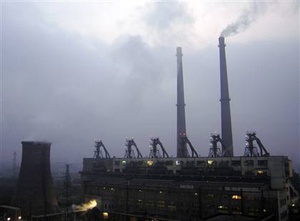
Joint letter – ICC reform and expansion risks diverting ETS Revenues from real climate action
In light of the European Commission’s ongoing considerations to amend the ETS State Aid Guidelines, revising the rules for Indirec...
News

Publish date: April 15, 2013
News
The urgent tone of the announcement by the world’s two largest emitters, which have frequently deadlocked international climate summits, was welcomed by Bellona as a long overdue note of conciliation by China and the US.
Bellona also said the new agreement bodes well for upcoming negotiations concerning Europe’s firm commitment to drastically cutting emissions by 2050.
“The new and encouraging tenor of this statement is the increased emphasis on climate change and the emphasis on scientific consensus,” said Svend Søyland, Bellona’s Senior Advisor on International Energy and Climate Issues. “We expect that both US and China will used the opportunity offered by the Fifth Assessment Report from IPCC to try to influence the laggards.”
The State Department announcement, published Saturday, said the two countries “recognize that the increasing dangers presented by climate change measured against the inadequacy of the global response requires a more focused and urgent initiative.”
The two countries added that they would to accelerate action to reduce greenhouse gases by advancing cooperation on technology, research, conservation, and alternative and renewable energy.
While some of this sounds familiar, the two countries broke ranks with past rhetoric, saying the statement that they “took special note of the overwhelming scientific consensus about anthropogenic climate change and its worsening impacts,” and recognized that the “[…] latest scientific understanding of accelerating climate change” and said “the urgent need to intensify global efforts to reduce greenhouse gas emissions, forceful, nationally appropriate action by the United States and China – including large-scale cooperative action – is more critical than ever.”
The Climate Change Working Group the two countries have agreed to establish will be headed by Todd Stern, US Special Envoy for Climate Change and Xie Zhenhua, Vice Chairman, the National Development and Reform Commission.
The goal of the group will be to place issues of technology exchange research, conservation, and alternative and renewable energy on faster track through the S&ED meeting this summer.
The S&ED is an annual high-level dialogue established in 2009 by President Barack Obama for the US and China to discuss a wide array of economic, political and security issues concerning both countries.
“In light of previous joint statements, existing arrangements, and ongoing work, both sides agree that it is essential to enhance the scale and impact of cooperation on climate change, commensurate with the growing urgency to deal with our shared climate challenges,” said the countries.
China and the US have a series of existing cooperation agreements on low-carbon energy, but US Secretary of State Kerry said Saturday at a joint press conference in Beijing with Chinese State Councilor Yang Jiechi that the new agreement raises the status of the nations’ joint climate efforts, The Hill reported.
Some of these efforts include the Clean Energy Research Center (CERC) and the US and China’s previous work in the Asia Pacific Partnership begun during the term of President George W. Bush.
Søyland said the new agreement was “the next logical step” in the continuation of these efforts.
China’s extreme industrial growth over the past several years and its heavy use of coal caused it some six years ago to surpass the US as the worlds largest emitter of greenhouse gasses. This has caused ground water shortages and contamination as well as air quality degeneration, forcing Beijing authorities to temporary close down factories and restrict air traffic.
The US, meanwhile, has reduced some of its carbon emissions as it rides a natural gas bonanza via hydraulic fracturing – itself a process that is environmentally questionable thanks to its risks to underground water supplies and releases of the greenhouse gas methane.
The US is meanwhile exporting excess coal to European Union markets, weakening the net reduction of carbon releases worldwide.

In light of the European Commission’s ongoing considerations to amend the ETS State Aid Guidelines, revising the rules for Indirec...

Today, the European Commission adopted a new Union list of energy Projects of Common Interest (PCIs) and Projects of Mutual Interest (PMIs), granting...

Central and Eastern European economies that have historically relied heavily on energy-intensive industries now face challenges in modernising their ...

By Carbon Balance Initiative (CB), Clean Air Task Force (CATF) and Bellona Europa As reported by Euractiv, at least 15 oil and gas producers...

Three main asks: Establish a robust EU biomass hierarchy to ensure limited bioresources are directed to the highest climate value and...
Get our latest news